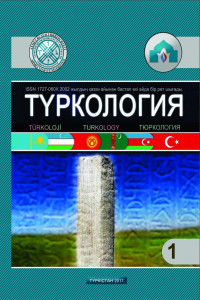STRATA OF DOMINATION IN THE DISCOURSE ON LANGUAGES OF THE VOLGA REGION IN THE FINAL DECADES OF EMPIRE
Проблемы влияния одного языка на другой, лексических или синаксиальных переходов часто выглядят как доминирование одного языка над другим. То есть языковое явление в любых отношениях показывает зависимость реципиента (народа, языка) от дающего (народа, языка)., дискурс, архивные материалы, преимущество “народного” языка, discourse, archival materials, advantage of “folk” language
STRATA OF DOMINATION IN THE DISCOURSE ON LANGUAGES OF THE VOLGA REGION IN THE FINAL DECADES OF EMPIRE
discourse, archival materials, advantage of “folk” language,
___
- 1. Ашмарин Н.И. 1898б. 7 июля. Ф. 93 оп. 1 д. 637 лл. 19, 19об, 98. НА РТ.
- 2. Ашмарин Н.И. 1898a. 26 июня. Ф. 93 оп. 1 д. 637 лл. 18, 18об, 99. НА РТ.
- 3. Ашмарин Н.И. 1901. Очеркъ литературной деятельности казанскихъ татаръ-мохаммеданъ за 1880-1895. Ред. Агафангел Ефимович Крымский и В А Гордлевский. Труды по востоковедению, издаваемые Лазаревским Институтом восточных языков вып. 4. Москва: Типография Варвары Гатцук.
- 4. Ашмарин Н.И. 1905. Несколько слов о современной литературе казанских татар. Журнал Министерства народного просвещения 361, № 9, раздел 3 (Сентябрь): 1-32.
- 5. Ашмарин Н.И. 1895. Декаденты запада и поэзия волжских инородцев. Волжский вестник.
- 6. Чужбинов. 1914. Татарский театр в России / К предстоящим гастролям в Петербурге “Передвижной труппы драматических и музыкально-вокальных артистов” под управлением И.Кудащева-Ашказарского. Театр и искусство XVIII, № 3: 62-63.
- 7. Werth, Paul. 2002. At the margins of orthodoxy : mission, governance, and confessional politics in Russia’s Volga-Kama region, 1827-1905. Ithaca: Cornell University Press.
- 8. Дело Казанской учительской семинарии. 1896. С перепиской о волнениях татар, о Татарской учительской школе. Казань. Ф. 93 оп. 1 д. 516. НА РТ.
- 9. Дело Казанской учительской семинарии. 1897. О переводе объявлений о чуме и разных переводов. Дело Казанской учительской семинарии. Казань, 25 мая. Ф. 93 оп. 1 д. 573. НА РТ.
- 10. Дело Казанской учительской семинарии. 1898a. О просмотрах разных переводов. Дело Казанской учительской семинарии. Ф. 93 оп. 1 д. 623. НА РТ.
- 11. Дело Казанской учительской семинарии. 1898б. С перепиской об отступниках и язычниках. Дело Казанской учительской семинарии. Ф. 93 оп. 1 д. 618. НА РТ.
- 12. Дело Казанской учительской семинарии. 1899. С перепиской о переводе русских учебников на татарский язык для крещеных татар. Дело Казанской учительской семинарии. Казань. Ф. 93 оп. 1 д. 677. НА РТ.
- 13. Бобровников Н.А. 1899. Инородческое население Казанской губернии. т. 1 (Татары и вотяки). Казань: П.В.Щетинкин.
- 14. Бобровников Н.А. С.Петербургский духовный цензурный комитет. 1899. Ноябрь 11. Ф. 93 оп. 1 д. 651 л. 6-6ob. НА РТ.
- ISSN: 1727-060X
- Başlangıç: 2002
- Yayıncı: Hoca Ahmet Yesevi Uluslararası Türk-Kazak Üniversitesi
OGUZ ELEMENTS IN DIALECTS OF KARAKALPAK LANGUAGE
ABOUT CONCEPTS «TURKISH LANGUAGE» AND «TURKIC LANGUAGES»
MEANINGS AND MARKS OF UNKNOWN SECOND AFFRICATE CONSONANTS IN ANCIENT TURKIC RUNIC LITERARY MONUMENTS
ABOUT THE HISTORY OF THE COSSACKS IN RUSSIA
THE PROJECT OF THE NEW KAZAKH ALPHABET BASED ON THE LATIN SCRIPT
GOD TYPE IN WEDDING CEREMONIAL “ALGYS”
AUTHOR'S ORAL POETRY MEDIEVAL TURKIC LITERATURE AND HABRAY-YIRAY
